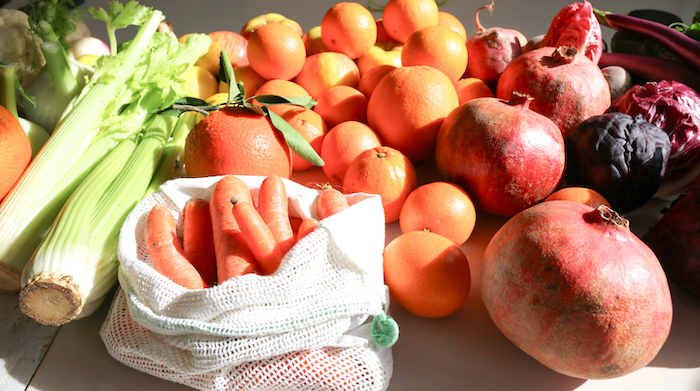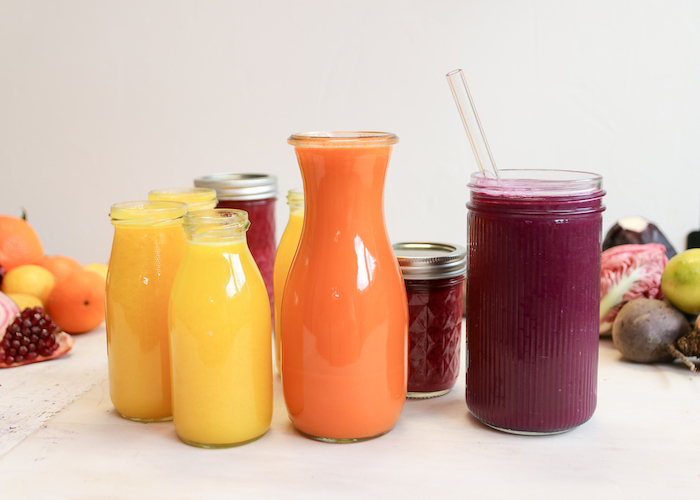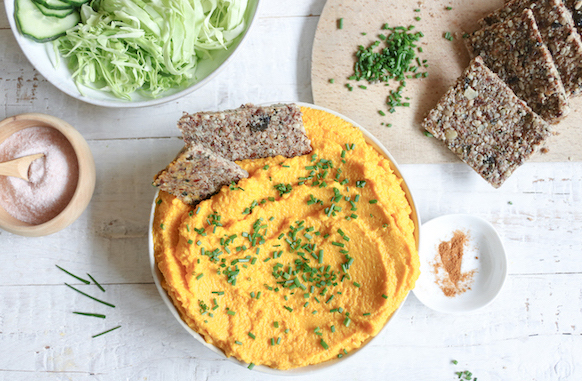Beta-carotene is an important phytonutrient that belongs to the group of carotenoids. These natural pigments give many foods their orange, yellow and red hues. Found in a variety of fruits and vegetables such as carrots, peppers, apricots and more, carotenoids play a central role in our diet.
Once absorbed into the body, beta-carotene is converted into vitamin A, which performs a variety of vital functions. This includes reducing oxidation processes, regulating cell growth, modulating immune reactions and much more, which contributes to supporting our overall health.
Explanation of The Terms Beta-Carotene, Retinol and Vitamin A
Beta-carotene, retinol and vitamin A are closely related to each other, but they have different functions and properties.
- Vitamin A is actually an umbrella term for a group of fat-soluble compounds found in the diet. It includes both retinol, the active form of vitamin A, and precursors such as beta-carotene.
- Retinol is the active form of vitamin A, found primarily in animal foods such as liver, eggs and dairy products. It can be used directly by the body.
- Beta-carotene is a precursor to vitamin A, found primarily in plant foods such as carrots, sweet potatoes and leafy green vegetables. Our bodies cannot use beta-carotene directly, but convert it into retinol in the intestinal lining with the help of the enzyme β-carotene dioxygenase.
Conversion rate
The conversion rate of beta-carotene to retinol in the human body can vary and depends on individual factors such as genetics, dietary composition and health.
Previous assumptions: For a long time it was assumed that approximately 6 micrograms (µg) of beta-carotene in the diet provided 1 µg of retinol equivalent (RE).
Recent evidence: Current estimates from the WHO and other health authorities suggest that conversion efficiency may be lower, with an estimated conversion rate of about 12 µg of beta-carotene to 1 µg of retinol equivalent in mixed diets.

The Health Effects of Beta-Carotene
After being converted into retinol in the body, beta-carotene performs many important functions. Improving eyesight and healthy skin are the first that come to mind, but the vitamin is involved in numerous other remarkable processes.
Antioxidant effect
As a powerful antioxidant, beta-carotene fights harmful free radicals that can damage cells and tissues. Adequate intake can reduce the risk of chronic diseases such as heart disease and certain types of cancer. Studies have shown that increased beta-carotene intake is associated with a lower risk of heart disease (1) and certain cancers (2).
Anti-inflammatory properties
The antioxidant effects of beta-carotene may also provide anti-inflammatory benefits, making it an important nutrient for counteracting inflammation (3) and related conditions such as arthritis, chronic bowel disease, and metabolic syndrome (4).
Stimulates immune system
Beta-carotene is essential for maintaining a strong immune system. It helps in the production of white blood cells that defend the body against infections and diseases (5).
Supports eye health
Vitamin A, which is formed in the body from beta-carotene, is crucial for maintaining healthy eyes. It protects against night blindness and can reduce the risk of age-related eye diseases such as macular degeneration. Studies have shown that people with high levels of beta-carotene have a lower risk of eye problems (6).
Promotes skin health
Beta-carotene is very valuable for overall skin health. It keeps the skin elastic and can slow down the skin aging process by supporting cell regeneration, stimulating the production of collagen and promoting the formation of lipids in the outer layer of the skin, thereby increasing skin moisture (7).
In addition, beta-carotene can increase the skin’s photoprotective effect by supporting the skin’s natural protective mechanisms. It can stimulate the production of melanin, which darkens the skin and acts as a natural sunscreen. Higher levels of melanin in the skin can reduce sensitivity to UV radiation and therefore reduce the risk of sunburn (8).
Are you interested in gaining a comprehensive understanding of the health benefits of a plant-based diet? Download the curriculum for our Holistic Nutrition Coach training program.
Foods High in Beta-Carotene
The foods highest in beta-carotene are typically brightly colored fruits and vegetables. Information about the content of beta-carotene in foods varies depending on the source and can also be influenced by factors such as degree of ripeness, cultivation method and preparation. For example, cooking can increase the bioavailability of beta-carotene by breaking down plant cell walls, making it easier for the body to absorb it.
The 10 Foods Richest in Beta-Carotene (mg/100g):
1 Sweet potato ~ 8.4 mg
2 Carrots ~ 8.3 mg
3 Pumpkin ~ 7.4 mg
4 Chard ~ 6.4 mg
5 Spinach ~ 5.6 mg
6 Kale ~ 4.8 mg
7 Red peppers ~ 3.3 mg
8 Broccoli ~ 2.8 mg
9 Apricots ~ 1.6 mg
10 Cantaloupe melons ~ 0.8 mg
Other excellent sources of beta-carotene are mango, parsley, lamb’s lettuce or beetroot. Interestingly, oranges do not contain significant amounts of beta-carotene, nor does turmeric. Turmeric owes its bright orange color to the natural dye curcumin.
Intake recommendations
There are no established reference values specifically for beta-carotene, but there are recommended daily doses for vitamin A. To compare these values, experts use special units such as “retinol equivalents” (RE) or “retinol activity equivalents” (RAE). These units take into account not only the pure content of vitamin A, but also the efficiency with which the body can absorb this vitamin from foods, as well as its interactions with other nutrients.
The National Institute of Health recommends intake levels for retinol of 0.7 mg for women and 0.9 mg for men. It’s believed that 1 mg of retinol is equivalent to approximately 12 mg of beta-carotene, facilitating the conversion between the two compounds. This implies that the daily requirement for beta-carotene can be met by consuming around 100 grams of carrots.
Juice for Eye and Skin Health
This juice supports beauty from within and brings a radiant glow to your eyes and skin 🥕🍏🍋
🥕 Carrots are essential for maintaining good vision due to their high beta-carotene content. Additionally, the antioxidants in carrots neutralize free radicals, helping to maintain radiant and youthful skin.
🍏 Apples provide plenty of vitamin C and important antioxidants, which support collagen production. Collagen is crucial for skin elasticity and firmness while also strengthening the skin’s barrier.
🍋 Lemons are rich in vitamin C, which also promotes collagen production and helps in detoxification.
🌿 Ginger has powerful anti-inflammatory and antioxidant properties that delay skin aging and boost a strong immune system.
Juice all the ingredients together and enjoy!

Improve Beta-Carotene Absorption
The absorption of beta-carotene can be enhanced through various methods, as it is a fat-soluble vitamin. Here are some tips to increase the bioavailability of beta-carotene:
Consumption with Fat
Since beta-carotene is fat-soluble, it is better absorbed when consumed with a fat source. Adding a bit of oil, avocado, nuts, or seeds to beta-carotene-rich foods can significantly improve absorption.
Chopping and Blending
Chopping, pureeing, or blending foods can also improve the bioavailability of beta-carotene. This process literally “releases” the beta-carotene, making it more accessible to digestive enzymes, leading to better absorption.
Combination with Other Nutrients
Studies suggest that the absorption of beta-carotene can also be enhanced by the presence of other antioxidants, such as vitamins C and E, in the diet. Therefore, it can be beneficial to combine beta-carotene-rich foods with vitamin E-rich nuts or vitamin C-rich fruits.
Cooking
Lightly cooking foods that contain beta-carotene can increase the release and absorption of the nutrient. Heating breaks down the cell walls, making beta-carotene more readily available to the body. While light cooking can improve absorption, overcooking should be avoided, as it can destroy some nutrients. Steaming or sautéing are good methods.

Conclusion
In conclusion, while retinol, the active form of vitamin A, is only present in animal-based foods, the body can derive vitamin A from a plant-based diet by converting plant-based beta-carotene.
Regularly incorporating a variety of orange, yellow, and green vegetables, as well as some fruits, into our diet can ensure sufficient beta-carotene intake, thereby harnessing the health benefits of vitamin A. By including these colorful foods, we can enjoy their antioxidant, anti-inflammatory, and immune-stimulating properties, promoting skin and eye health sustainably.
Would you like to join our unique program, based on nutritional sciences and practice-oriented training for gaining a high level of health?
We’re more than happy to inform you about all that our training program offers on our website!




0 Comments